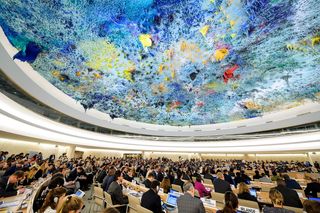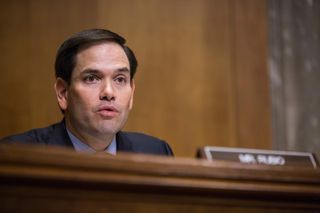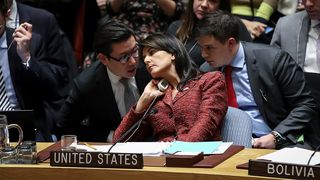Key takeaways
- The Trump White House has systematically deprioritised human rights over the last 18 months in a major departure from previous administrations.
- At the same time as the administration has pulled back from human rights, democracy promotion and multilateral engagement, China, Russia and other states have grown more assertive in challenging democratic norms, both at home and globally.
- White House tumult and lack of policy coherence has allowed some human rights and democracy concerns to be addressed by lower-level State Department activity and limited congressional activism.
- There are signs that Secretary of State Mike Pompeo might emphasise human rights more than his predecessor, but it is too early to tell and highly possible that Trump’s disinterest will continue, accentuating an incoherent approach.
- While taking account of strategic considerations and regional sensitivities, Australia should strengthen its promotion of human rights and governance in Southeast Asia and the South Pacific to support the rules-based order.
Introduction
For the first 18 months, Donald Trump’s administration has systematically deprioritised human rights — driven largely by the president’s disinterest, ‘America first’ transactionalism, and ‘pattern of appreciation for strongman-type leaders’.1 This is a major departure from previous presidencies, both Republican and Democrat. Since President Carter, human rights and democracy promotion have been a constant, if selectively pursued, part of US foreign policy. Successive administrations have weighed human rights concerns among US national interests and stressed that the United States has a role to play in human rights and democracy promotion globally.
Trump’s national security cabinet has paid scant attention to human rights (apart from US Ambassador to the United Nations Nikki Haley’s rhetorical focus) and elevated the promotion of immediate economic and security interests over civil and political freedoms.2 When human rights have been considered, they have generally been viewed instrumentally, to serve a short-term security purpose. The administration has also recently withdrawn from the UN Human Rights Council, citing its failure to reform and anti-Israel resolutions.3 As the Trump White House has pulled back from human rights promotion — and multilateral engagement — China, Russia and other states have grown more assertive in challenging human rights and democratic norms at home, globally and multilaterally.4
While the president’s disregard for human rights has pervaded US policy, the administration’s chaos has allowed some human rights and democracy concerns to be driven by lower-level State Department activity.
While the president’s disregard for human rights has pervaded US policy, the administration’s chaos has allowed some human rights and democracy concerns to be driven by lower-level State Department activity, including at the embassy level and through legislated programs, and through some limited congressional activism.5
There are a few early signs Secretary of State Mike Pompeo might have more of a human rights focus than his predecessor Rex Tillerson,6 though it is uncertain how far this will extend. It is too early to tell if Pompeo — and National Security Advisor John Bolton — will view human rights in the context of values-based competition with China and Russia set out in the National Security Strategy and National Defense Strategy, and assess that US silence on human rights/democracy can damage US medium-long term interests.7 Even if Trump’s national security team moves in this direction, it is far from certain Trump would join them. It is highly possible his disinterest in human rights will continue, accentuating an incoherent posture.
Canberra, meanwhile, is assessing how Washington’s evolving stance affects Australia’s interests. Australia had encouraged the United States to remain on the Human Rights Council — of which Australia is currently a member — and continues to support reform from within. Canberra will continue to encourage the Trump foreign policy team to flesh out its ‘free and open Indo Pacific’ strategy — which could have a human rights/democracy dimension — and look for ways to contribute to this strategy, especially in infrastructure, energy and economic governance promotion.8 More broadly, Australia should increase its own efforts to promote human rights/political and economic governance in Southeast Asia and the South Pacific (while factoring in strategic concerns and sensitivities) in support of the rules-based order.9
Human rights in US foreign policy
The Trump White House has a distinctly narrower conception of the national interest than its recent predecessors on both sides of the political divide. Human rights and democracy promotion have been debated throughout American history, and Republican and Democratic administrations from Carter onwards have sought to strike some balance between pursuing US security/economic interests and promoting human rights.
The extent to which human rights have been a feature of foreign policy has of course varied from president to president and over the course of presidencies. Carter made human rights a cornerstone of his administration’s foreign policy: he discontinued past practice of ignoring human rights violations in allied states, and strongly criticised states such as South Africa and Argentina. Reagan initially sought to move away from Carter’s posture, then ended up with more of a human rights focus: he talked publicly about Soviet dissidents and pursued quiet diplomacy with the Kremlin on their behalf.10 While George H. W. Bush adopted a more strictly pragmatic human rights approach, he still sent 28,000 US troops to Somalia to ‘save thousands of innocents’.11 Bill Clinton’s approach included intervening militarily in Bosnia (after years of delay) and Kosovo to bring an end to ethnic cleansing.12
President Carter made human rights a cornerstone of his administration’s foreign policy: he discontinued past practice of ignoring human rights violations in allied states, and strongly criticised states such as South Africa and Argentina.
George W. Bush prioritised human rights and democracy promotion and linked states’ human rights records with their security and stability, for instance on North Korea.13 But the Iraq invasion and its aftermath led to a backlash against such efforts both within the United States and internationally. Accordingly, in its first year the Obama administration was tentative in adopting a human rights posture: it downplayed human rights as it negotiated strategic issues with China and pursued engagement with Iran and Myanmar.14 Towards the end of its first year, the Obama administration laid out a ‘principled pragmatism’ approach towards states such as China and Russia, engaging them ‘on issues of mutual interest’15 and strategic importance while publicly criticising human rights abuses and supporting dissidents.16
Both the George W. Bush and Obama administrations had active human rights agendas in Asia.17 Bush publicly criticised human rights violations and repression in North Korea, Myanmar, and China18 and focused on promoting religious freedom and countering human trafficking.19 Obama tried to bring ASEAN states together around values such as human rights,20 raised human rights concerns in private meetings with leaders such as Cambodia’s Hun Sen,21 and downgraded relations with Thailand after the 2014 Thai coup.22
Successive administrations have balanced engaging governments on areas of mutual interest with criticising human rights violations, and exercised judgment as to when to use ‘quiet diplomacy’ on human rights and when to criticise publicly.23 Officials have promoted human rights not only to cudgel states instrumentally for short-term strategic payoff, but also for intrinsically moral reasons, which also bring long-term strategic gains. This approach can serve US interests by providing leverage in negotiations and legitimising US power, making it easier to achieve desired outcomes.
More broadly, human rights and democracy are norms within the rules-based order which has underpinned American security and prosperity. Particularly during the Cold War, administrations recognised the soft power value of human rights and democracy promotion in differentiating the US brand from that of communist and authoritarian regimes.24 Likewise, there has been an awareness that silence on human rights abuses or acquiescence to dictatorship can damage long-term US interests.25 Washington’s support for the Marcos regime stoked anti-American sentiment in the Philippines, for instance, and current American military support for Saudi bombing in Yemen is also fostering Yemeni anti-Americanism.26
The Trump administration and the human rights agenda
The Trump administration’s human rights posture is characterised by the president’s disinterest, though the administration’s tumult and lack of a coherent approach has enabled mid- and lower-level officials in the State Department to respond to human rights concerns at the local level.
The president’s disinterest
Trump outlined a major downgrade in the importance of human rights concerns in his inaugural address and also in speeches in Saudi Arabia and to the UN General Assembly: “We are not here to tell other people how to live, what to do, who to be, or how to worship.”27 This is a notable shift from his predecessors and is consistent with Trump’s focus on sovereignty and suspicion of multilateralism and any other institutional constraints upon the United States. The president has viewed human rights and democracy as American values not to be imposed on others, in a departure from previous administrations’ views on universal freedoms enshrined in the Universal Declaration of Human Rights.28 Trump’s approach is consistent with his hardline immigration posture, including the now-reversed family separation policy.
President Trump has viewed human rights and democracy as American values not to be imposed on others, in a departure from previous administrations’ views on universal freedoms enshrined in the Universal Declaration of Human Rights.
The president has not made a habit of raising human rights publicly, and it is not clear if he has been mentioning them privately in meetings with leaders such as President Xi of China and President Duterte of the Philippines.29 This silence on human rights abuses and democratic backsliding is coupled with regular expressions of admiration for authoritarian leaders such as Xi and Duterte, as well as Turkey’s President Erdogan and Russia’s President Putin. For instance, Trump has appeared to compliment rather than criticise Duterte on the Philippines’ drug policy, notwithstanding the extra-judicial killings of thousands of Filipinos. He has refrained from addressing repressive tactics in Erdogan’s Turkey — even when they occurred on American soil30 — and from criticising President Putin for repressive tactics. At the Singapore summit, Trump said North Koreans have a ‘fervour’ for North Korean dictator Kim Jong Un.31 Trump has also invited leaders with questionable human rights records to the White House, such as Thai leader Prayuth Chan-Ocha, notwithstanding his leadership of the 2014 Thai coup32 and Egyptian President Al-Sisi.33
However, there have been instances where human rights issues have broken through, primarily when they served national security or political purposes. Trump has used human rights to criticise Iran and North Korea. He has supported Venezuelan political protests, although this policy shift and the rollback of elements of Obama’s Cuba re-engagement policy appear animated at least partly by considerations of South Florida expatriate populations.34 Trump has also been engaged in some cases involving the detention of American citizens in Iranian or Egyptian prisons.35 And he has on occasion responded to powerful television footage such as the Syrian regime’s chemical weapons attacks.36 But these are exceptions to Trump’s inclination against involvement in the internal affairs of other states.
Trump’s national security team
Trump White House national security officials have similarly deprioritised human rights in favour of short-term security and economic interests. Former Secretary of State Rex Tillerson characterised the administration’s approach in this way: “in some circumstances, if you condition our national security efforts on someone adopting our values, we probably can’t achieve our national security goals or our national security interests.”37
The State Department did not have a strong centralised human rights posture during Tillerson’s tenure. Tillerson made clear his preference for quiet, behind-closed-doors discussions with counterparts instead of public rebuking.38 He reversed Obama-era human rights decisions, often for strategic reasons, including embarking on fuller engagement with Thailand,39 overlooking transgressions by the Philippines,40 and dropping the Obama-era human rights conditions attached to arms sales to Bahrain.41 Also for strategic reasons, he promoted Iraq and Myanmar above the State Department’s 2017 human trafficking report’s lowest tier, overruling State Department officials’ recommendations.42
In contrast, US Ambassador to the United Nations Nikki Haley has spoken out on human rights, though her portfolio limits how much she can influence foreign policy.43 She has directed America’s UN diplomacy on human rights and spoken strongly on the Syrian regime’s treatment of its people, the plight of Myanmar’s Rohingya, and repression and human rights abuses in Venezuela and North Korea. She has convened the first Security Council meeting solely on human rights, and briefed Trump on human rights concerns such as the situation in Venezuela.44
However, Haley has recently withdrawn the United States from the UN Human Rights Council over its problematic membership (with states with poor human rights records such as Saudi Arabia, Cuba and Venezuela gaining seats) and “chronic bias against Israel”.45 Ongoing frustration with the council’s failure to reform has appeared to outweigh arguments that the United States would retain more influence by remaining on the council and continuing to push for reform from within.46

Administration policy statements such as the National Security Strategy (NSS) and the National Defence Strategy (NDS) have not prioritised human rights, but neither have they closed the door entirely. The NSS has depicted human rights as American — rather than universal — values, and stated that the United States does not seek to promote democracy apart from by inspiration.47 But the NSS has also set out a conceptual framework of ‘principled realism’ and sought to reinforce the rules-based order. It has described a values-based geopolitical competition between democracies and authoritarian major powers, within the context of which there seems scope for supporting human rights/democracy.48 The NDS has similarly outlined an ideological competition between the United States and authoritarian powers that “seek to create a world consistent with their authoritarian models”.49 Likewise, an administration official has defined the ‘free’ within the developing ‘free and open Indo Pacific’ strategy “in terms of good governance, in terms of fundamental rights, in terms of transparency and anti-corruption”.50 So there appears to be space within this emerging regional strategy for human rights and democracy promotion.
While Trump’s former National Security Advisor H.R. McMaster latterly showed some concern that Trump’s disinclination on human rights/democracy promotion was undermining US security interests,51 it remains to be seen how human rights policy will fare under John Bolton and Mike Pompeo. Historically Bolton has been suspicious of the human rights agenda and favoured military over diplomatic options. In previous roles Pompeo has been hawkish and valued hard power, though at his confirmation hearing he stressed that human rights and democracy promotion have important roles to play in US foreign policy.52 He has also made religious freedom an administration priority,53 and released a statement critical of China on the 29th anniversary of Tiananmen Square,54 and another supporting LGBTI month, affirming America’s ‘commitment to protecting and defending the human rights of all’.55 These might be early signs that Pompeo will seek to pursue more of a human rights agenda than his predecessor, although it is too early to tell how his posture will evolve. America’s recent withdrawal from the Human Rights Council suggests he was not ultimately swayed by the argument that the United States would retain more leverage by staying within the institution, albeit flawed.
So it remains to be seen whether Trump’s national security apparatus will focus on the geopolitical dimension of human rights and democracy promotion — including the competition over political systems — and assess that US silence on human rights/democracy can advantage rival powers, including by leaving states more susceptible to outside influence. It is also far from clear to what degree the president subscribes to these policy documents, undercutting their impact.
Grass-roots activity within State
The Trump White House’s policy dysfunction has left room for the quiet pursuit of human rights lower down the State Department bureaucracy at the mid- and lower-level. Human rights and democracy promotion have been institutionalised through prior legislation, for example through ongoing democracy promotion programs funded by Congress.56 State Department briefings have continued to raise human rights and democracy concerns, including on Myanmar and Cambodia, and some US diplomatic joint statements (such as the US-Sri Lanka partnership dialogue statement)57 have continued to include human rights language.
State Department briefings have continued to raise human rights and democracy concerns, including on Myanmar and Cambodia, and some US diplomatic joint statements (such as the US-Sri Lanka partnership dialogue statement) have continued to include human rights language.
It has also left room for some local-level embassy activism in response to human rights and democracy concerns.58 For instance in China, the US embassy has coordinated with the German Embassy on a couple of occasions to criticise the detention and call for the release of several Chinese human rights activists.59 There has also been embassy activity in the Philippines, with the US ambassador speaking out on extra-judicial killing associated with Duterte’s drug policy.60 US diplomats in Cambodia have expressed deep concern over Cambodian government legislation constraining the opposition and freedom of expression, and met with members of the opposition.61 And in Hungary, the US chargé d’affaires has spoken out on the importance of freedom of the press and protection of journalists in the wake of Hungarian Prime Minister Orban’s repressive tactics.62
Congress, NGOs and the public
Congress has had limited success in influencing the Trump administration’s human rights agenda, as it has been constrained by its constitutional role and congressional Republicans’ reluctance to take on a mercurial president popular with the Republican base. Congress has traditionally exercised influence on human rights through the passage of legislation, its appropriations power, treaty ratifications, lobbying the executive, and public commentary.
Select members of Congress have been reasonably active on human rights during this administration. For example, 15 senators (seven Republicans and eight Democrats) signed an open, bipartisan letter urging Trump to prioritise human rights and democracy.63 Republican senators Marco Rubio, John McCain, and Lindsey Graham protested Egypt’s NGO-restricting legislation and called for the administration to withhold aid to Egypt. Rubio has also lobbied Trump directly on Venezuela. And Senator McCain and House Foreign Affairs Committee Chair Ed Royce have criticised Cambodia’s democracy backsliding and attacks on the media and opposition — and criticised Myanmar’s treatment of the Rohingya.64
Under its appropriations power, Congress has decided State Department funding levels, including to human rights/democracy promotion programs, and has pushed back vigorously against proposed White House budget cuts.65 But successful congressional pushback has been limited. While congressional activists have successfully pushed for administration action on Cambodia,66 an effort to prevent US$500 million in arm sales to Saudi Arabia failed to secure sufficient votes,67 and an attempt to extend the Leahy Law forbidding US assistance to foreign security forces violating human rights to the Philippine police did not succeed. While typically vocal on human rights, congressional Republicans appear to have sought to minimise areas of conflict with Trump as they pursued big ticket items such as tax cuts, increased defence spending, and infrastructure.
Non-governmental organisations have continued to draw attention to human rights considerations during the Trump administration.68 In terms of public opinion, it does not appear from polling data that Trump won votes by deprioritising human rights: in US polling conducted in November 2015, 77 per cent supported US global leadership on promoting human rights.69 In the first year of the administration, polling has indicated a majority of Americans still favour US global engagement,70 but it remains to be seen whether Trump’s disinterest in human rights and benign view of authoritarianism will pervade American public opinion.

Implications
US silence on human rights/democracy is another instance of the president’s disinterest in supporting the post-1945 rules-based order the United States helped create. At the same time, China and Russia have grown more assertive in challenging the international human rights regime. China has moved, with Russia’s support, to block funding for human rights oversight in the UN secretary-general’s office, as part of a broader campaign to limit human rights and democracy promotion within the United Nations by curtailing program funding and gaining the votes of other Security Council members.71 China has also exploited UN member states’ dislike of American use of human rights to criticise rivals.72 Furthermore, China and Russia have thwarted US efforts to have a Security Council briefing on Syrian human rights violations. In another indication of China’s assertiveness on global norms, China has been joined by states such as Venezuela, Egypt and Saudi Arabia on the Human Rights Council to pass a motion framing human rights as development-focused and state-centric, rather than universal.73
Australian-US cooperation on regional infrastructure, energy and economic governance will help buttress institutions and governance in the region.
For Australia, there is the potential for greater policy divergence with the United States if the Trump administration continues to disengage from the multilateral architecture Canberra supports. The current centrepiece of Australia’s ‘principled and pragmatic’74 global human rights posture is its membership of the UN Human Rights Council; as a middle power, Canberra has judged it beneficial to enhance Australia’s global diplomatic influence in UN decisionmaking and help support the rules-based order.75 Australia had supported American efforts to reform the Human Rights Council, including pushing back against its alleged anti-Israel bias, and had voted with the United States in opposing an international inquiry into human rights in Gaza. But Canberra had diverged with the Trump administration on issues such as gender and reproductive rights, had encouraged Washington to maintain influence by remaining on the Human Rights Council, and has continued to support reforming the council from within.76 Now the United States has withdrawn from the council, Australia will likely align with European member states.77
That said, Australia’s regional human rights posture has not been totally out of step with the administration’s less proselytising approach. Australia has maintained diplomatic engagement with Southeast Asian states such as Myanmar, Thailand and Malaysia, in a pragmatic assessment of the security and economic benefits of engagement, regional stability, and regional cooperation (against transnational crime, for instance). Australia’s approach — including not wanting the United States to push too hard on human rights in the region — is driven by the sensitivities of not wanting to be seen to preach to and interfere in the internal affairs of Asian states, and not wanting to push the region towards China.
Canberra should continue to work with the administration to flesh out its ‘free and open Indo-Pacific’ strategy, with its governance promotion dimension. Australian-US cooperation on regional infrastructure, energy and economic governance will help buttress institutions and governance in the region.78 There is also scope for Canberra to start to strengthen its own promotion of human rights and governance in Southeast Asia and the South Pacific. If such an initiative is carefully designed to take account of geopolitical considerations and regional sensitivities, it could serve Australia’s interests by enhancing Australia’s soft power and helping to support the rules-based order.79






